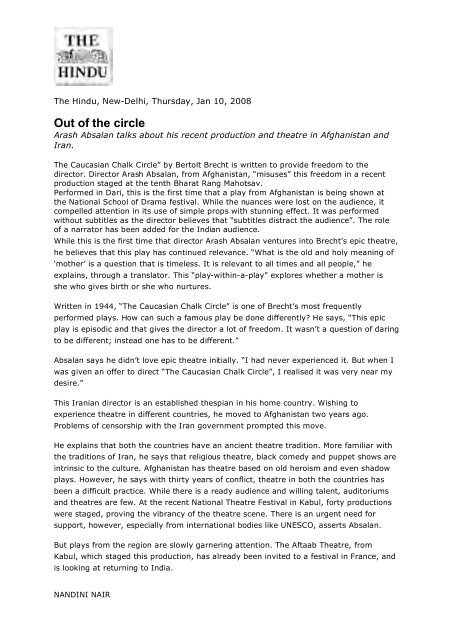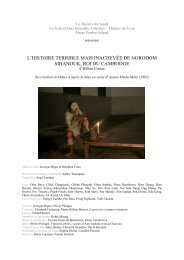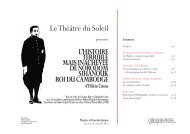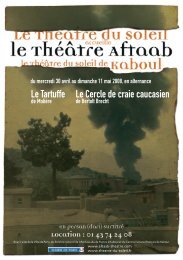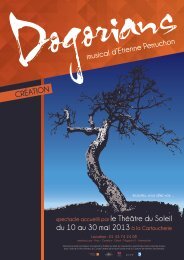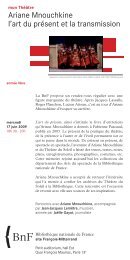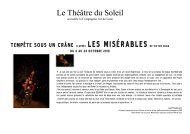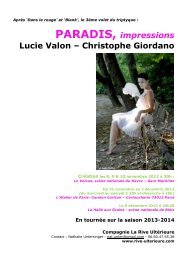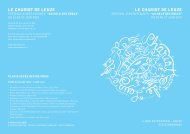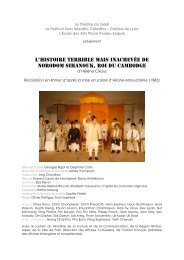la revue de presse - Le Théâtre du Soleil
la revue de presse - Le Théâtre du Soleil
la revue de presse - Le Théâtre du Soleil
Create successful ePaper yourself
Turn your PDF publications into a flip-book with our unique Google optimized e-Paper software.
The Hin<strong>du</strong>, New-Delhi, Thursday, Jan 10, 2008Out of the circleArash Absa<strong>la</strong>n talks about his recent pro<strong>du</strong>ction and theatre in Afghanistan andIran.The Caucasian Chalk Circle” by Bertolt Brecht is written to provi<strong>de</strong> freedom to thedirector. Director Arash Absa<strong>la</strong>n, from Afghanistan, “misuses” this freedom in a recentpro<strong>du</strong>ction staged at the tenth Bharat Rang Mahotsav.Performed in Dari, this is the first time that a p<strong>la</strong>y from Afghanistan is being shown atthe National School of Drama festival. While the nuances were lost on the audience, itcompelled attention in its use of simple props with stunning effect. It was performedwithout subtitles as the director believes that “subtitles distract the audience”. The roleof a narrator has been ad<strong>de</strong>d for the Indian audience.While this is the first time that director Arash Absa<strong>la</strong>n ventures into Brecht’s epic theatre,he believes that this p<strong>la</strong>y has continued relevance. “What is the old and holy meaning of‘mother’ is a question that is timeless. It is relevant to all times and all people,” heexp<strong>la</strong>ins, through a trans<strong>la</strong>tor. This “p<strong>la</strong>y-within-a-p<strong>la</strong>y” explores whether a mother isshe who gives birth or she who nurtures.Written in 1944, “The Caucasian Chalk Circle” is one of Brecht’s most frequentlyperformed p<strong>la</strong>ys. How can such a famous p<strong>la</strong>y be done differently? He says, “This epicp<strong>la</strong>y is episodic and that gives the director a lot of freedom. It wasn’t a question of daringto be different; instead one has to be different.”Absa<strong>la</strong>n says he didn’t love epic theatre initially. “I had never experienced it. But when Iwas given an offer to direct “The Caucasian Chalk Circle”, I realised it was very near my<strong>de</strong>sire.”This Iranian director is an established thespian in his home country. Wishing toexperience theatre in different countries, he moved to Afghanistan two years ago.Problems of censorship with the Iran government prompted this move.He exp<strong>la</strong>ins that both the countries have an ancient theatre tradition. More familiar withthe traditions of Iran, he says that religious theatre, b<strong>la</strong>ck comedy and puppet shows areintrinsic to the culture. Afghanistan has theatre based on old heroism and even shadowp<strong>la</strong>ys. However, he says with thirty years of conflict, theatre in both the countries hasbeen a difficult practice. While there is a ready audience and willing talent, auditoriumsand theatres are few. At the recent National Theatre Festival in Kabul, forty pro<strong>du</strong>ctionswere staged, proving the vibrancy of the theatre scene. There is an urgent need forsupport, however, especially from international bodies like UNESCO, asserts Absa<strong>la</strong>n.But p<strong>la</strong>ys from the region are slowly garnering attention. The Aftaab Theatre, fromKabul, which staged this pro<strong>du</strong>ction, has already been invited to a festival in France, andis looking at returning to India.NANDINI NAIR


